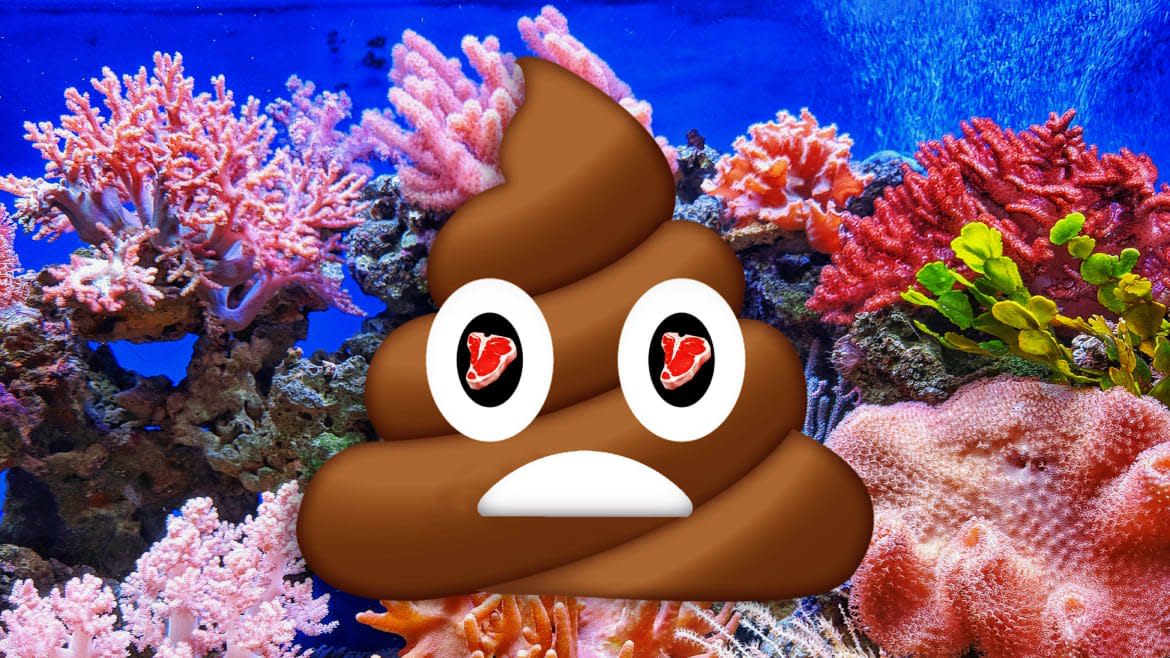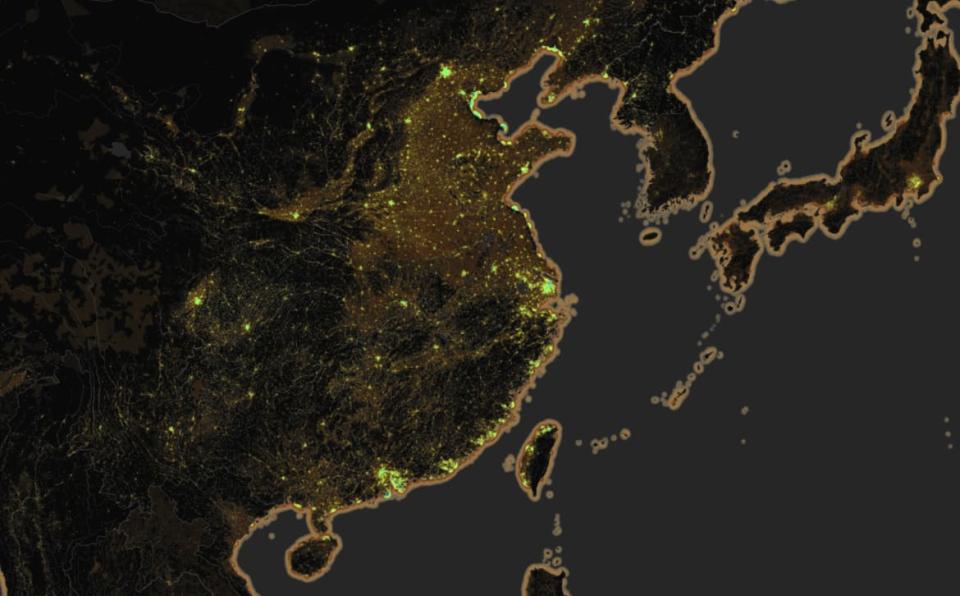Poop From Meat Eaters Is Killing Coral Reefs

By now, it’s pretty clear that eating meat is bad for the environment. Most meat production takes up vast swathes of land, uses immense amounts of water, and is responsible for nearly 60 percent of all carbon emissions produced by food production. But there’s another downside that’s always overlooked: Eating meat leads to poop loaded with nitrogen, which moves from burgers to toilets to watersheds and eventually devastates the world’s coastlines and coral reefs.
Nitrogen is an element found in amino acids, the building blocks of protein. When we eat meat, a lot of that nitrogen comes out in our poop. A new model described in the journal PLOS ONE on Wednesday estimates that human wastewater alone adds 6.8 million tons of nitrogen—close to 14 billion pounds, or the weight of roughly 28 billion hamburgers—into coastal waters each year. That’s equivalent to roughly 40 percent of the nitrogen output already associated with agriculture. Excessive nitrogen in the water causes algae to bloom quickly, which in turn harms nearby wildlife and the surrounding ecosystems by using up available oxygen, releasing toxins, and driving away other organisms. The authors estimate that 58 percent of the world’s coral reefs and 88 percent of seagrass beds are exposed to nitrogen from human waste. And the problem will likely get worse as humans continue to eat meat.
“As people switch to eating animal-based protein diets, we eat more and more nitrogen, and then we excrete almost all of it out,” lead author Cascade Tuholske, a geographer and postdoctoral research scientist at Columbia University’s Earth Institute, told The Daily Beast. In a nutshell, he said the findings show, “Hey, you're eating a ton of burgers. And some of those ecological impacts are methane emissions, land-use change, [agriculture] runoff, but it's also having a huge impact just from our wastewater.”
How a Tiny Robot Could Help Save Coral Reefs
The new model—and a very cool corresponding map—neatly synthesizes complex global data on population, meat consumption, 135,000 watersheds, human access to wastewater services, and how nitrogen moves when it reaches the ocean. As a result, the research team can determine what locations are hit hardest by nitrogen from wastewater.
The model is able to predict nitrogen movements down to a square kilometer, making it easy to pinpoint very specific problem areas. It also accounts for different sources of waste, including regular sewage, septic systems, and direct input (untreated waste), because, as the authors wrote, “solutions depend on the source.”
The study’s authors found that nearly half of the world’s wastewater-derived nitrogen comes from just 25 watersheds, most of which are concentrated in India, the Korean Peninsula, and China. The Yangtze River alone accounts for 11 percent. The three countries with the highest total nitrogen output are China, India, and the United States, which was expected. “Overall where there are a lot of people, especially really dense populations on big watersheds, that didn't really surprise me,” said Tuholske.

A screenshot of the interactive map developed to visualize the new wastewater model. The eastern coast of China is a huge producer of nitrogen from wastewater.
He’s especially intrigued by high nitrogen output in areas like the Mississippi watershed, despite the fact that the U.S. is a developed nation that can afford better wastewater treatment facilities. As it turns out, water sanitation systems in the U.S. and Europe are really good at eliminating pathogens from wastewater but not as effective at removing nitrogen.
“We eat a lot of meat in the U.S., and if our wastewater plants are not sucking out nitrogen, it's almost even worse because they're concentrating them,” said Tuholske.
Nitrogen from wastewater will likely become a bigger problem as populations swell and as people in rapidly developing countries, like China and Brazil, switch to more meat-heavy diets, the authors wrote. There’s no escaping the fact that eating more meat leads to more nitrogen in human waste.
“Unless a person is accumulating muscle mass, most of the nitrogen that enters the human mouth is excreted,” James N. Galloway, a biogeochemist at the University of Virginia, told The Daily Beast. “This is independent of whether the nitrogen is in animal or non-animal protein. The more nitrogen consumed, the more nitrogen excreted.”
Galloway notes that some sources are less harmful than others. Meat production of large animals like cows puts out more nitrogen into the environment per unit of meat consumed than does meat from smaller animals like chickens and non-meat protein.
Fortunately, several environmental organizations are studying excess nitrogen and ways to reduce its impact, including the World Resources Institute, the Surfriders Foundation, and the Nature Conservancy.
Of course, those solutions—especially when it comes to improving wastewater treatment infrastructure, can’t be implemented without government investment. But Tuholske is hopeful that raising awareness about nitrogen from wastewater can help move the needle. “This is a problem we can solve and by putting it on the map, [this study] is a step forward towards doing that,” he said.
The paper’s findings can help inform our personal food choices too. Tuholske emphasized the intent isn’t to prescribe restrictions on people’s diets, but rather reveal the consequences of their food choices. Tuholske experienced that himself when he lived in the coastal city of Santa Barbara and realized that the beaches were always closed after heavy rains because of bacterial contamination from wastewater. “I had no understanding of the magnitude that through my own waste, I produce impacts on so many people in ecosystems downstream from where I live,” he said.
Eating meat isn’t inherently bad for the environment, but the way that we produce it and the rate at which we consume it has devastating consequences for ocean ecosystems. That can change if we are able to foster healthier relationships with the food we eat and support sustainable food systems.
“To borrow from Ted Lasso’s ‘football is life’, food is life,” Tuholske says. The hope is that in the future, we’ll make food choices that preserve life, too.
Got a tip? Send it to The Daily Beast here
Get our top stories in your inbox every day. Sign up now!
Daily Beast Membership: Beast Inside goes deeper on the stories that matter to you. Learn more.

